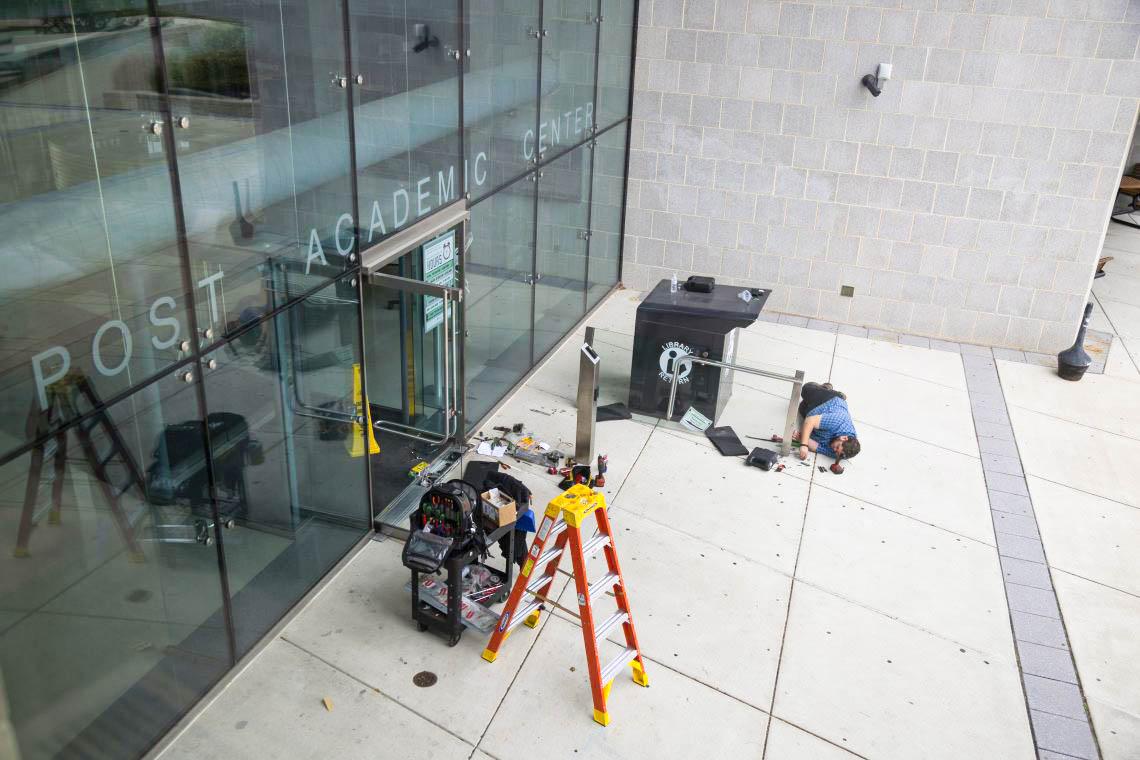The university is looking for a permanent solution to address the often broken entrance doors to Post Learning Commons (PLC) and Francis A. Drexel Library.
In the first two months of this school year, the doors have needed to be repaired twice, with the most recent service request on Sept. 25, according to Kevin Kane, assistant vice president of Facilities Operations. During the last school year, the doors needed to be repaired five times.
“Over the next couple years, we’ll be thinking about raising those doors, and when we do that, we’ll see if there’s a better technology available,” Kane said.
The doors were installed in spring 2012, when the library was renovated and the PLC addition was built. They started to pose problems after two years of use, according to Library Director Anne Krakow.
Krakow said one of the reasons the doors have so frequently needed repairs is due to all of the foot traffic into the library.
“They are the most used doors on campus,” Krakow said. “The library sees over half a million people every year. The doors are used not only by library users, but by those who want to cut through to the Science Center and the rest of campus. The high usage was not anticipated.”
Kane agreed the state of the current doors is ultimately due to a design flaw. There is more foot traffic than anticipated by the architects who designed the building. Their key focus had been on the building’s aesthetic, Kane said.
“When the Post Learning Commons was built, the architect had a vision, a specific vision for how that entrance should look there,” Kane said. “I don’t think the designers anticipated the amount of use that they’re getting.”
The fact that the doors’ mechanisms are underground also contributes to the problem, both Krakow and Kane said. Those mechanisms must be accessed through a panel below the door and are particularly susceptible to weather.
“When the ground freezes and thaws out, the ground heats and settles, and that impacts the bottom in particular, and that’s problematic,” Kane said.
Any solution will have to weigh form and function, according to Kane.
“We’d like to probably get the operator’s equipment out of the ground and get it up high, but it may not look as nice,” Kane said.
Right now, repairs have to be contracted out. Advanced Doors Services Inc., based in Hatfield, Pennsylvania, currently handles the repairs.
“When you see a door is out of order for a long time, it is because a part is on order,” said Marian Courtney, library operations manager. “So it’s not that they haven’t addressed it. It’s not that the repair company has not been here to look at it.”
Kane said the university will continue to assess the doors along with the cost of maintenance over the next few years. Part of that assessment has involved talking to people at the Comcast Center in Center City, which was built around the same time as PLC and with similar doors.
“We’ve been picking the brains of the folks that design and maintain the doors down there to see if there’s a technology to better fit, or if there’s a door system we should be thinking about for that building,” Kane said.
There is currently no time frame or set plan regarding a permanent solution, Kane said.
“We’ve got to be sure that whatever we install as a fix is going to be better than what we have now,” Kane said.
In the meantime, Krakow does not like the message that frequent “out of order” signs relay to library patrons and others passing through this central campus building.
“It doesn’t look good for us to always have an out of order sign,” Krakow said. “We’re aware of how much those doors are used. The library’s a very service-oriented organization, and if we always have a sign that says ‘out of order don’t use,’ that’s not a very friendly welcome.”













































